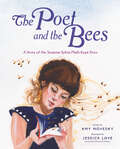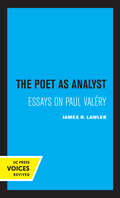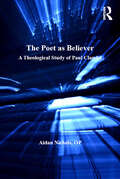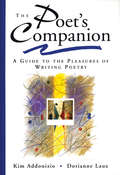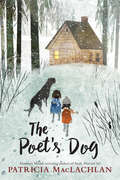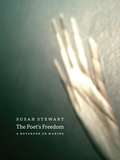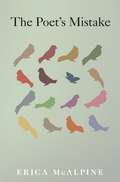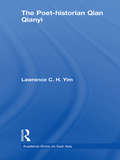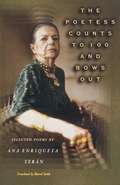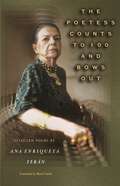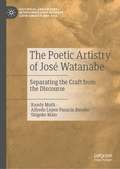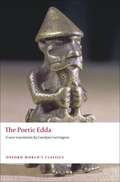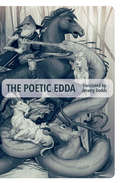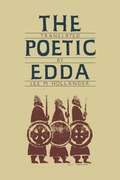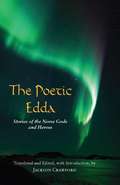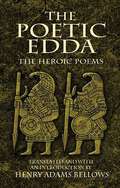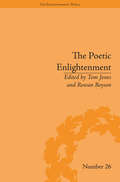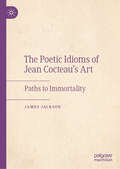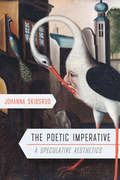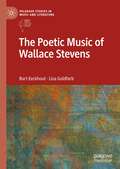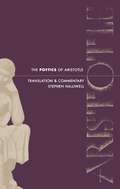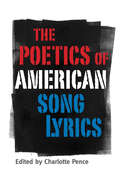- Table View
- List View
The Poet and the Bees: A Story of the Seasons Sylvia Plath Kept Bees
by Amy NoveskyA mesmerizing picture book about the iconic poet Sylvia Plath and her final writingsLove, bees don&’t live long.But honey lives forever. Words, too.Sylvia Plath is remembered for her stirring poetry and the tragic legacy her work left behind. But it is lesser known that she was a beekeeper and completed her last book of poems while tending to her bees and harvesting honey.Author and beekeeper Amy Novesky shines a new light on the life and work of Plath through the lens of her last seasons with her beloved bees—and how during their short and busy lives, they filled her with inspiration and hope—while the evocative paintings by Stonewall Book Award winner Jessica Love reveal the tenderness and wonder of one of America's most iconic poets.
The Poet as Analyst: Essays on Paul Valery
by James R. LawlerThis title is part of UC Press's Voices Revived program, which commemorates University of California Press’s mission to seek out and cultivate the brightest minds and give them voice, reach, and impact. Drawing on a backlist dating to 1893, Voices Revived makes high-quality, peer-reviewed scholarship accessible once again using print-on-demand technology. This title was originally published in 1974.
The Poet as Believer: A Theological Study of Paul Claudel (Routledge Studies in Theology, Imagination and the Arts)
by Aidan Nichols O.P.This is the first comprehensive study of the theological significance of Paul Claudel, a poet frequently cited by literary-minded theologians in Europe and theologically-minded poets (such as von Balthasar, de Lubac and Eliot). His writing combines cosmology and history, Bible and metaphysics, liturgy and the drama of human personality. His work, which continues to arouse discussion in France, was acclaimed in his lifetime as the 'summa poetica' of a new Dante. Aidan Nichols' study demonstrates how Claudel's oeuvre, which is not only poetry but theatre and prose including biblical commentaries, constitutes a rich resource for constructive doctrine, liturgical preaching, and theological reflection. As the comparable example of Geoffrey Hill, Professor of Poetry at Oxford suggests, Aidan Nichols illuminates how Claudel's synthesis of many dimensions remains an important way of practising poetry in the Christian tradition today.
The Poet's Companion: A Guide to the Pleasures of Writing Poetry
by Kim Addonizio Dorianne LauxFrom the nuts and bolts of craft to the sources of inspiration, this book is for anyone who wants to write poetry-and do it well. ?The Poet's Companion ?presents brief essays on the elements of poetry, technique, and suggested subjects for writing, each followed by distinctive writing exercises. The ups and downs of writing life--including self-doubt and writer's block--are here, along with tips about getting published and writing in the electronic age. On your own, this book can be your "teacher," while groups, in or out of the classroom, can profit from sharing weekly assignments. <P><P><i>Advisory: This book offers only partial accessibility. We have kept it in the collection because it is useful for some of our members. Benetech is actively working on projects to improve accessibility issues such as these in the future.</i>
The Poet's Dog
by Patricia MaclachlanFrom Newbery Medal winner Patricia MacLachlan comes a poignant story about two children, a poet, and a dog and how they help one another survive loss and recapture love.Teddy is a gifted dog. Raised in a cabin by a poet named Sylvan, he grew up listening to sonnets read aloud and the comforting clicking of a keyboard. Although Teddy understands words, Sylvan always told him there are only two kinds of people in the world who can hear Teddy speak: poets and children.Then one day Teddy learns that Sylvan was right. When Teddy finds Nickel and Flora trapped in a snowstorm, he tells them that he will bring them home--and they understand him. The children are afraid of the howling wind, but not of Teddy's words. They follow him to a cabin in the woods, where the dog used to live with Sylvan . . . only now his owner is gone.As they hole up in the cabin for shelter, Teddy is flooded with memories of Sylvan. What will Teddy do when his new friends go home? Can they help one another find what they have lost?
The Poet's Freedom: A Notebook on Making
by Susan StewartWhy do we need new art? How free is the artist in making? And why is the artist, and particularly the poet, a figure of freedom in Western culture? The MacArthur Award–winning poet and critic Susan Stewart ponders these questions in The Poet’s Freedom. Through a series of evocative essays, she not only argues that freedom is necessary to making and is itself something made, but also shows how artists give rules to their practices and model a self-determination that might serve in other spheres of work.Stewart traces the ideas of freedom and making through insightful readings of an array of Western philosophers and poets—Plato, Homer, Marx, Heidegger, Arendt, Dante, and Coleridge are among her key sources. She begins by considering the theme of making in the Hebrew Scriptures, examining their accountof a god who creates the world and leaves humans free to rearrange and reform the materials of nature. She goes on to follow the force of moods, sounds, rhythms, images, metrical rules, rhetorical traditions, the traps of the passions, and the nature of language in the cycle of making and remaking. Throughout the book she weaves the insight that the freedom to reverse any act of artistic making is as essential as the freedom to create. A book about the pleasures of making and thinking as means of life, The Poet’s Freedom explores and celebrates the freedom of artists who, working under finite conditions, make considered choices and shape surprising consequences. This engaging and beautifully written notebook on making will attract anyone interested in the creation of art and literature.
The Poet's Mistake
by Erica McAlpineWhat our tendency to justify the mistakes in poems reveals about our faith in poetry—and about how we readKeats mixed up Cortez and Balboa. Heaney misremembered the name of one of Wordsworth's lakes. Poetry—even by the greats—is rife with mistakes. In The Poet's Mistake, critic and poet Erica McAlpine gathers together for the first time numerous instances of these errors, from well-known historical gaffes to never-before-noticed grammatical incongruities, misspellings, and solecisms. But unlike the many critics and other readers who consider such errors felicitous or essential to the work itself, she makes a compelling case for calling a mistake a mistake, arguing that denying the possibility of error does a disservice to poets and their poems.Tracing the temptation to justify poets' errors from Aristotle through Freud, McAlpine demonstrates that the study of poetry's mistakes is also a study of critical attitudes toward mistakes, which are usually too generous—and often at the expense of the poet's intentions. Through remarkable close readings of Wordsworth, Keats, Browning, Clare, Dickinson, Crane, Bishop, Heaney, Ashbery, and others, The Poet's Mistake shows that errors are an inevitable part of poetry's making and that our responses to them reveal a great deal about our faith in poetry—and about how we read.
The Poet-historian Qian Qianyi (Academia Sinica on East Asia)
by Lawrence C.H YimThis book is the first English language study of Qian Qianyi (1582-1664) - a poet and literary critic during the Ming-Qing dynastic transition. Although Qian’s works constitute some of the greatest achievements in pre-modern Chinese lyric poetry, they have been largely understudied and are poorly understood. Qian was reputed for his own aesthetic that changed the character of late Ming and early Qing poetry. His name, however, was branded with infamy for his disloyalty to the Ming dynasty when it dissolved. Consequently, his works were censored by the Qing court and have been forgotten by most critics until recently. Lawrence C.H Yim focuses on Qian’s poetic theory and practice, providing a critical study of Qian’s theory of poetic-history (shishi) and a group of poems from the Toubi ji. He also examines the role played by history in early Qing verse, rethinking the nature of loyalism and historical memory in seventeenth-century China. Poetry of the Ming-Qing transition is distinguished by its manifest historical consciousness and the effort and give meaning to current historical events, an effort characterized by the pathos of introspection and mourning for the past..This pathos translates into what can be called a poetics of Ming loyalism, exemplified and championed by, intriguingly, the later works of Qian Qianyi himself.
The Poetess Counts To 100 And Bows Out
by Ana Enriqueta TeránAna Enriqueta Terán is arguably Venezuela's finest poet. Celebrated throughout the Spanish-speaking world, she is almost unknown among anglophones. Until now only a handful of her poems have been translated into English, giving at best a diluted impression of a uniquely intense imagination. This bilingual edition reveals the power and beauty of this poet's Spanish poems through English versions of corresponding force. It invites readers to enter Terán's world--a world at once strongly Venezuelan and universally human, imbued with great beauty, sardonic humor, pitiless compassion, lucid wisdom, and joyful affirmation. Selected from several volumes of Terán's work, these poems span half a century of composition and show an extraordinary range in both form and substance. Some are written in closed forms, some in free verse. Some are carefully evocative representations of the landscapes and cityscapes that have nourished the poet's intelligence and imagination. Others are dramatic character studies. All are infused with Terán's rare sensibility and realized through language that manages to be at once graceful, urgent, and explosive. This volume is a treasure for all lovers of poetry.
The Poetess Counts to 100 and Bows Out: Selected Poems by Ana Enriqueta Terán (The Lockert Library of Poetry in Translation #51)
by Ana Enriqueta TeránAna Enriqueta Terán is arguably Venezuela's finest poet. Celebrated throughout the Spanish-speaking world, she is almost unknown among anglophones. Until now only a handful of her poems have been translated into English, giving at best a diluted impression of a uniquely intense imagination. This bilingual edition reveals the power and beauty of this poet's Spanish poems through English versions of corresponding force. It invites readers to enter Terán's world--a world at once strongly Venezuelan and universally human, imbued with great beauty, sardonic humor, pitiless compassion, lucid wisdom, and joyful affirmation. Selected from several volumes of Terán's work, these poems span half a century of composition and show an extraordinary range in both form and substance. Some are written in closed forms, some in free verse. Some are carefully evocative representations of the landscapes and cityscapes that have nourished the poet's intelligence and imagination. Others are dramatic character studies. All are infused with Terán's rare sensibility and realized through language that manages to be at once graceful, urgent, and explosive. This volume is a treasure for all lovers of poetry. Deal Struck with Happiness ? How much sweetness to make right the night and this clutch of anemones near thin smooth consoling stones, stones havens of southern weather. Of a woman who watches Cepheids quaver among lightbursting mangroves. Of a woman who offers cats-eyes and clematis only, Islands, for the sake of setting right her deal struck with happiness.
The Poetic Artistry of José Watanabe: Separating the Craft from the Discourse (Historical and Cultural Interconnections between Latin America and Asia)
by Randy Muth Alfredo López-Pasarín Basabe Shigeko MatoConnecting multiple academic areas, this book addresses three aspects of the poetry of José Watanabe: 1) the construction of "Japaneseness" in the poetic works and public figure of the poet, 2) the skillful manipulation of literary devices characteristic of his poetry, 3) the unique sensibilities and moods of ephemerality and ineffableness prevalent in his poetic works. The trans/interdisciplinary nature of the book intends to promote a dialogue and exchange of ideas across academic fields neglected in most studies on the Peruvian poet. Written by researchers based in Japan, it offers a unique perspective of Japanese cultural phenomenon unavailable in previous studies. The goal of the book is to shed light on how Japan continues to be seen by the West through essentialist notions and stereotypical representations, as well as to highlight the fact that the literary quality of Watanabe’s poetic artistry does not reside in it being “Japanese” and can be appreciated without resorting to essentialist categorizations based on positive Japanese stereotypes.
The Poetic Edda
by Carolyne LarringtonThe collection of Norse-Icelandic mythological and heroic poetry known as the Poetic Edda contains the great narratives of the creation of the world and the coming of Ragnarok, the Doom of the Gods. The mythological poems explore the wisdom of the gods and giants, narrating the adventures of the god Thor against the hostile giants and the gods' rivalries amongst themselves. The heroic poems trace the exploits of the hero Helgi and his valkyrie bride, the tragic tale of Sigurd and Brynhild's doomed love, and the terrible drama of Sigurd's widow Gudrun and her children. Many of the poems predate the conversion of Scandinavia to Christianity, allowing us to glimpse the pagan beliefs of the North. Since the rediscovery of the Poetic Edda in the seventeenth century, its poetry has fascinated artists as diverse as Thomas Gray, Richard Wagner, and Jorge Luis Borges. This is the first complete translation to be published in Britain for fifty years, and it includes a scholarly introduction, notes, a genealogy of the gods and giants, and an index of names. With a new, modern package this title is an invaluable classic for your bookshelf. About the Series: For over 100 years Oxford World's Classics has made available the broadest spectrum of literature from around the globe. Each affordable volume reflects Oxford's commitment to scholarship, providing the most accurate text plus a wealth of other valuable features, including expert introductions by leading authorities, voluminous notes to clarify the text, up-to-date bibliographies for further study, and much more.
The Poetic Edda
by Jeramy Dodds"This is a wonderful new edition of the Poetic Edda. It captures the language, vitality, and rhythms of the original."--Jesse Byock, PhD, UCLAGods, giants, the undead, dwarves, Valkyries, heroes, kidnapping, dragons, and a giant wolf are just some of the stars in these Norse tales. Committed to vellum in Iceland around 1270, The Poetic Edda has compelled the likes of Richard Wagner, J. R. R. Tolkien, Jorges Luis Borges, and W.H. Auden. Jeramy Dodds transmits the Old Icelandic text into English without chipping the patina of the original.Jeramy Dodds's Crabwise to the Hounds was shortlisted for the Griffin Poetry Prize and won the Trillium Book Award for poetry.
The Poetic Edda
by Lee M. HollanderThe Poetic Edda comprises a treasure trove of mythic and spiritual verse holding an important place in Nordic culture, literature, and heritage. Its tales of strife and death form a repository, in poetic form, of Norse mythology and heroic lore, embodying both the ethical views and the cultural life of the North during the late heathen and early Christian times. Collected by an unidentified Icelander, probably during the twelfth or thirteenth century, The Poetic Edda was rediscovered in Iceland in the seventeenth century by Danish scholars. Even then its value as poetry, as a source of historical information, and as a collection of entertaining stories was recognized. This meticulous translation succeeds in reproducing the verse patterns, the rhythm, the mood, and the dignity of the original in a revision that Scandinavian Studies says "may well grace anyone's bookshelf. "
The Poetic Edda: Stories of the Norse Gods and Heroes (Hackett Classics)
by Jackson Crawford"The poems of the Poetic Edda have waited a long time for a Modern English translation that would do them justice. Here it is at last (Odin be praised!) and well worth the wait. These amazing texts from a 13th-century Icelandic manuscript are of huge historical, mythological and literary importance, containing the lion's share of information that survives today about the gods and heroes of pre-Christian Scandinavians, their unique vision of the beginning and end of the world, etc. Jackson Crawford's modern versions of these poems are authoritative and fluent and often very gripping. With their individual headnotes and complementary general introduction, they supply today's readers with most of what they need to know in order to understand and appreciate the beliefs, motivations, and values of the Vikings." --Dick Ringler, Professor Emeritus of English and Scandinavian Studies at the University of Wisconsin–Madison
The Poetic Edda: The Heroic Poems
by Henry Adams BellowsPassed down long ago from poet to poet and singer to singer in the great oral tradition of Scandinavia, this collection of heroic sagas explores a mythical world. Incorporating legends of Norse gods and heroes, great fires and floods, superhuman warriors and doomed lovers, these dramatic poems weave vivid portraits of powerful characters caught up in passion, ambition, and destiny. Filled with gripping conceptions of the world's creation and ultimate destruction, the verses chronicle the triumphs and tragedies of a lost mythological past, where words of wisdom and beauty echoed off the steel of waving swords.The hero poems of The Poetic Edda are literary monuments that have inspired such luminaries as Richard Wagner and J. R. R. Tolkien. This Dover edition, which includes exceptionally detailed and complete translations by Henry Adams Bellows, will continue to enchant new generations of readers. It is a companion to The Poetic Edda: The Mythological Poems, also available from Dover Publications.
The Poetic Enlightenment: Poetry and Human Science, 1650–1820 (The Enlightenment World #26)
by Rowan BoysonThe essays in this edited collection look at the role of poetry in the development of Enlightenment ideas. As scholarly disciplines began to emerge – anthropology, linguistics, psychology – the ancient art of poetry was invoked to create new ways of defining and expanding this philosophy of human science.
The Poetic Idioms of Jean Cocteau’s Art: Paths to Immortality
by James JacksonCocteau had an ambition many a poet has: to become immortal. But he, perhaps more than most, addressed this ambition directly in a great many of his plays, poems, and films. This book puts the work of this elusive and compelling poet under the microscope, examining how he channeled the concerns and anxieties of his age (and beyond) into his creations. Putting aside anecdotes of his life and other biographical minutiae, it turns to the creative achievements of the polymath – some well-known, some less so – to examine how he wrestles with the profound questions that concern human nature and enters into a conversation with his creative forebears on matters relating to love, imagination, suffering, and consolation.
The Poetic Imperative: A Speculative Aesthetics
by Johanna SkibsrudThis book aims to expand our sense of poetry's reach and potential impact. It is an effort at recouping the poetic imperative buried within the first taxonomic description of human being: "nosce te ipsum," or "know yourself." Johanna Skibsrud explores both poetry and human being not as fixed categories but as active processes of self-reflection and considers the way that human being is constantly activated within and through language and thinking. By examining a range of modern and contemporary poets including Wallace Stevens, M. NourbeSe Philip, and Anne Carson, all with an interest in playfully disrupting sense and logic and eliciting unexpected connections, The Poetic Imperative highlights the relationship between the practice of writing and reading and a broad tradition of speculative thought. It also seeks to demonstrate that the imperative "know yourself" functions not only as a command to speak and listen, but also as a call to action and feeling. The book argues that poetic modes of knowing - though central to poetry understood as a genre - are also at the root of any conscious effort to move beyond the subjective limits of language and selfhood in the hopes of touching upon the unknown. Engaging and erudite, The Poetic Imperative is an invitation to direct our attention simultaneously to the finite and embodied limits of selfhood, as well as to what those limits touch: the infinite, the Other, and truth itself.
The Poetic Imperative: A Speculative Aesthetics
by Johanna SkibsrudThis book aims to expand our sense of poetry's reach and potential impact. It is an effort at recouping the poetic imperative buried within the first taxonomic description of human being: "nosce te ipsum," or "know yourself." Johanna Skibsrud explores both poetry and human being not as fixed categories but as active processes of self-reflection and considers the way that human being is constantly activated within and through language and thinking. By examining a range of modern and contemporary poets including Wallace Stevens, M. NourbeSe Philip, and Anne Carson, all with an interest in playfully disrupting sense and logic and eliciting unexpected connections, The Poetic Imperative highlights the relationship between the practice of writing and reading and a broad tradition of speculative thought. It also seeks to demonstrate that the imperative "know yourself" functions not only as a command to speak and listen, but also as a call to action and feeling. The book argues that poetic modes of knowing - though central to poetry understood as a genre - are also at the root of any conscious effort to move beyond the subjective limits of language and selfhood in the hopes of touching upon the unknown. Engaging and erudite, The Poetic Imperative is an invitation to direct our attention simultaneously to the finite and embodied limits of selfhood, as well as to what those limits touch: the infinite, the Other, and truth itself.
The Poetic Music of Wallace Stevens (Palgrave Studies in Music and Literature)
by Bart Eeckhout Lisa GoldfarbWallace Stevens’s musicality is so profound that scholars have only begun to grasp his ties to the art of music or the music of his own poetry. In this study, two long-time specialists present a polyphonic composition in which they pursue various interlocking perspectives. Their case studies demonstrate how music as a temporal art form may affect a poetic of ephemerality, sensuous experience, and affective intensification. Such a poetic, they argue, invites flexible interpretations that respond to poetry as an art of textual performance. How did Stevens enact the relation between music and memory? How can we hear his verse as a form of melody-making? What was specific to his ways of recording birdsong? Have we been missing the latent music of Richard Strauss, Gustav Mahler, and Claude Debussy in particular poems? What were the musical poetics he shared with Igor Stravinsky? And how is our experience of the late poetry transformed when we listen to a musical setting by Ned Rorem? The Poetic Music of Wallace Stevens will appeal to experts in the poet’s work, students of Modernism in the arts, and a wider audience fascinated by the dynamics of exchange between music and poetry.
The Poetics Of Aristotle: Translation And Commentary
by Stephen HalliwellIncorporating the best modern work on the Poetics, Halliwell's translation is aimed at those who want a reliable version of Aristotle's ideas along with concise and stimulating guidance. <P><P> A running commentary explains the structure and detail of Aristotle's argument, attempts to provoke further thought about the work's strengths and weaknesses, and offers suggestions on relating the Poetics to later stages of literary theory and practice.
The Poetics of American Song Lyrics (American Made Music Series)
by Charlotte PenceThe Poetics of American Song Lyrics is the first collection of academic essays that regards songs as literature and that identifies intersections between the literary histories of poems and songs. The essays by well-known poets and scholars including Pulitzer Prize winner Claudia Emerson, Peter Guralnick, Adam Bradley, David Kirby, Kevin Young, and many others, locate points of synthesis and separation so as to better understand both genres and their crafts. The essayists share a desire to write on lyrics in a way that moves beyond sociological, historical, and autobiographical approaches and explicates songs in relation to poetics. Unique to this volume, the essays focus not on a single genre but on folk, rap, hip hop, country, rock, indie, soul, and blues. The first section of the book provides a variety of perspectives on the poetic history and techniques within songs and poems, and the second section focuses on a few prominent American songwriters such as Bob Dylan, Bruce Springsteen, and Michael Stipe. Through conversational yet in-depth analyses of songs, the essays discuss sonnet forms, dramatic monologues, Modernism, ballads, blues poems, confessionalism, Language poetry, Keatsian odes, unreliable narrators, personas, poetic sequences, rhythm, rhyme, transcription methods, the writing process, and more. While the strategies of explication differ from essay to essay, the nexus of each piece is an unveiling of the poetic history and poetic techniques within songs.
